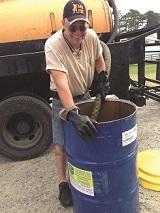
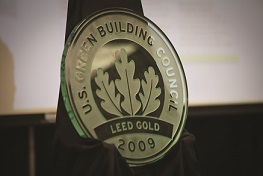 Throughout the country, many communities and businesses are making the move toward clean industry. For them, the numbers need to add up, meaning it has to make economic sense. But becoming more environmentally focused involves more than dollar and cents – there are also very real human health, lifestyle and environmental factors as well that are also taken into consideration.
Throughout the country, many communities and businesses are making the move toward clean industry. For them, the numbers need to add up, meaning it has to make economic sense. But becoming more environmentally focused involves more than dollar and cents – there are also very real human health, lifestyle and environmental factors as well that are also taken into consideration.
“There are a number of benefits to a business pursuing clean industry initiatives. Using alternative and clean energy sources can result in a cost savings for a business and avoids the volatility and fluctuating costs of traditional fossil fuels like oil and gasoline and being at the mercy of the entire electric grid. There is also a growing number of federal and state incentives in the form of tax credits, grants and loans for pursuing clean industry initiatives,” said Secretary C. Alan Walker with the Pennsylvania Department of Community and Economic Development.
“Another benefit to a business is simply being a good corporate citizen and environmental steward of their community. Making the effort to contribute to the health and welfare of the people of a community will result in loyalty, hard-working employees and a general level of respect for that company,” he added.
A perfect example of this win-win mentality is in eastern North Carolina’s Research Triangle area.
Green Circle NC, founded in 2011 by Dean Price and Stephan Caldwell, collects old cooking oil from area restaurants and sells it to biodiesel companies. Now, they are showing education leaders in the region that making the switch to biodiesel fuels in school buses can improve the environment, the health of school children and bring down costs.
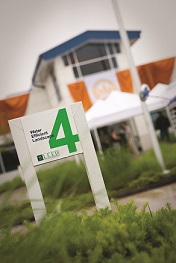
He has worked with local school districts to start burning the biodiesel in school buses as part of his “Biodiesel 4 Schools” program, where Green Circle NC splits profits with school systems. Part of the rationale for partnering with schools is to improve the health of children.
“Biodiesel is also 87 percent better for the school children to breathe than traditional diesel,” said Price. “Asthma is the largest reason for absenteeism in North Carolina’s schools.”
Price has even partnered with Whole Foods grocery stores to sell special funnels that screw onto 2-liter bottles, designed to bring children into the act of collecting used oil at home.
“It’s good for the schools, the restaurants and creates a closed loop in the community to create their own local fuel source to power their school buses,” said Price. “There’s no reason each community can’t have their own biodiesel facility and for local farms to grow crops like biofuels. In the process, you create jobs and prosperity.”
A Drive for Clean Energy Generation
The push for clean energy creation is fueled by government legislation, community awareness and sheer business need.
In north central Minnesota, Minnesota Power is an investor-owned utility serving about 145,000 customers. More than half of the electricity it sells is to industrial customers that operate around the clock, such as taconite plants and paper mills. While Minnesota’s renewable energy standard mandates that 25 percent of its electricity must come from renewable sources by 2025, the company is well ahead of schedule to meet that.
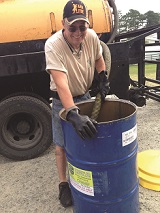 “While we received 95 percent of our energy from coal in 1995, today, Minnesota Power is 20 percent renewable. We expect to meet the state’s mandate by 2015 – 10 years ahead of schedule,” said Nancy Norr, director of regional development at Minnesota Power.
“While we received 95 percent of our energy from coal in 1995, today, Minnesota Power is 20 percent renewable. We expect to meet the state’s mandate by 2015 – 10 years ahead of schedule,” said Nancy Norr, director of regional development at Minnesota Power.
It’s doing so by investing in solar, wind, hydro and biomass.
One of its biomass facilities is owned by Packaging Corp. of America (PCA) in International Falls, Minnesota, which is on the U.S./Canada border.
“The company is using its own waste to help meet its electrical needs,” said Norr. “It owns and operates a biomass facility that meets about half of the electrical requirements they need and Minnesota Power supplies the other half.”
International Falls is slated to be home to a large-scale biomass facility called RECAP (Renewable Energy Clean Air Project) that will have the capability to process approximately 200 tons of biomass per day.
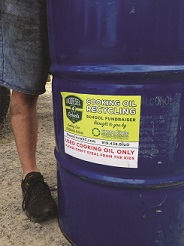
RECAP can be described as a win-win scenario. It reduces waste disposal in landfill, producing useful materials such as heat, biofuels, electricity and roadbed material from the leftover inorganic waste. Gasification is cleaner than typical incineration. It will also enhance economic development in an area that needs it.
“We have Voyagers International Park and the Boundary Waters in this part of the world. There is a real sensitivity to these jewels of the nation. We’re trying to balance industry with these national areas and it’s a challenge. Projects like RECAP let us do both,” said Nevanen.
On a smaller scale in the western edge of North Carolina in Watauga County, the Watauga County Landfill Gas-to-Energy Project powers the adjoining landfill facility and sells the excess power back to Duke Energy. Its biomass facility was recognized by the EPA’s Landfill Methane Outreach Program with a Project of the Year award.
“Between the electric bill savings and revenue from electricity and green power sales, the county earns more than $70,000 per year from the project,” said Joseph Furman, director of Watauga County’s Planning & Inspections and Economic Development.
Businesses Get in the Act
Companies of all sizes are also realizing the positive business and environmental impact of clean industry initiatives.
Mountain Lumber Company in Boone, North Carolina, which is in Watauga County, is one. The company is committed to making sustainable building practices standard. Its President and Founder Dwight Simmons first became acquainted with green building when helping build the Sustainability Center at Furman University in Greenville, South Carolina, in 2007. Shortly thereafter, Mountain Lumber Company became a Certified Green Dealer, one of the first in the nation. The company is also certified by Forestry Stewardship Council (FSC), a rigorous program that tracts sustainable lumber from harvest to installation.

“Additionally, we believe in buying locally. It is a priority for us to buy from local vendors and dealers. On a somewhat larger scale, we’ve made an effort to find and use companies who manufacture products in North Carolina. In 2013, 41 percent of our sales volume came from products manufactured in North Carolina. The dual benefit of this strategy is to help our state economy and avoid carbon emissions that would occur if we procured products from other parts of the U.S. and overseas.”
Appalachian Mountain Brewery is another Boone, North Carolina, business committed to clean industry practices. The publically traded brewery focuses its business model on sustainability, community and philanthropy.
“Community stewardship and environmental sustainability are a core part of the business, said Sean Spiegelman, CEO and founder. “The brewery’s modern equipment utilizes American-made JV Northwest Brewing Equipment, a 5kW array of solar panels to offset electricity along with a recapturing system to save water in the brew process.”
In keeping with the brewery’s sustainable mission to reduce, reuse and recycle, Appalachian Mountain Brewery has a grain exchange program where it donates all spent grain to local farms. It also has a “Pints for Non-Profits Program,” donating a portion of proceeds from each beer sold to local non-profit organizations.
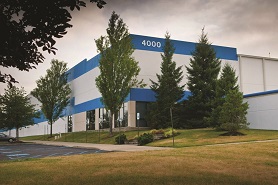
The Nestle Waters North America water bottling facility in Breinigsville, Pennsylvania, is the first LEED GOLD food manufacturing plant in the state. It saves 66 kWh of electrical energy per 1,000 liters of bottled water produced due to on-site bottle production and continuous reduction of plastic in bottles, along with the use of natural light, light conservation measures and heat energy recovery.
A push to sustainability isn’t limited to younger companies. Just Born, Inc. is the producer of iconic candies such as Peeps marshmallow candies, Hot Tamales and Mike and Ike and is the 10th largest candy company in the U.S. It has been headquartered in Bethlehem, Pennsylvania, for 82 of its 91 years. With a new LEED Gold-certified warehouse, the headquarters and primary production plant became certified as Landfill Free in 2013.
“We recycle 92 percent of our waste, with the remaining eight percent processed as a renewable fuel at an energy-to-waste facility. In addition, lighting efficiency projects save us almost 1 million kWh per year and air compressor, HVAC and chiller modernization have resulted in 1.3 million kilowatt hours (kWh) savings per year,” said Matthew Pye, vice president of trade relations and corporate affairs at Just Born Quality Confections.
“Another great example of clean industry in action is Procter & Gamble’s manufacturing facility near Scranton, Pennsylvania,” said C. Alan Walker with the Pennsylvania Department of Community and Economic Development. “The company entered into a gas lease and purchase agreement to utilize natural gas flowing from wells on its property. As a result, they have replaced 10 billion cubic feet of gas each year that was previously sourced from the gulf coast and now have the opportunity to generate revenue by selling excess gas into the market. They have also invested in electric co-generation with excess power being supplied and sold into the local power grid.”
Procter & Gamble converted fleet vehicles and forklifts to run on natural gas. This move alone is projected to save nearly $1 million annually and reduce carbon emissions by 850 tons per year.
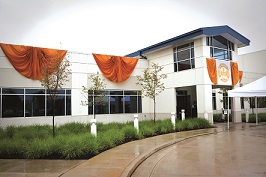
“We’ve been analyzing ways to increase the tax base of the economy,” said Kenneth Dobson, director of economic development at Fulton County, Georgia Economic Development. “We have a 22-mile long area with 12,000 acres adjacent to Atlanta’s Hartsfield-Jackson International Airport in Fulton County with many older buildings that lend themselves to redevelopment and adaptive reuse.”
The result is the US -29 CleanTech Eco Development Corridor. The corridor is gaining increased attention among technology-based businesses operating in the sustainable development space.
“We’re targeting businesses that operate in the clean and green tech space in areas like sensor technologies, polymers, biofuels and biomass, energy storage systems, geothermal systems, solar industry, co-generation and recycling.”
The corridor boasts of entrenched infrastructure and logistics with easy highway access and the nearby proximity to the nation’s busiest airport. Kenneth Dobson envisions the area becoming a campus-like setting where businesses in the clean industry space can share synergies and vision.
“We’re helping companies realize that sustainable eco development makes sense. We’re showing them that they can increase profits by becoming more energy-efficient in their buildings,” said Dobson. “The whole conversation is about beginning to create an environment where we can make money, do what we’re here to do as businesses and do it in an environmentally sustainable way that helps our bottom line, shareholders and environment – and do it in a way that’s good for the economy and creates the next-generation of businesses to our tax base.”
That sentiment is echoed throughout the country – that clean industry initiatives are thriving and are helping both the environment and companies' bottom lines.

